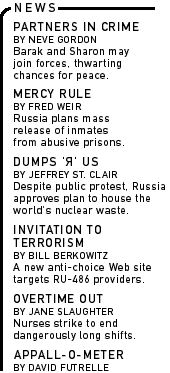

|

|

|

|
| |
|
|
|
The early reviews are in on the new George W. Bush administration. It has all the elements of the classic horror story: a predictable plot, familiar villains and an unshakable sense of déjà vu. On the following pages, we take a look at Bush's nominees and appointments, a diverse cast of characters in every way but ideology. Left to their own devices, this collection of unrepentant cold warriors, anti-choice extremists, Wise-Use desperados and corporate shills (as well as a couple of reasonable old-fashioned conservatives) could make for a harrowing next four years. Can the forces of good thwart this evil plan? Well, as In These Times went to press, thousands of townspeople were taking their torches to Washington to protest Dubya's inauguration, making one thing clear: There will be no honeymoon! Craig Aaron
As George W. Bush moves into the White House this month, he would do well to heed the words of an outgoing president 40 years ago. "We must guard against the acquisition of unwarranted influence ... by the military-industrial complex," Dwight Eisenhower said. "The potential for the disastrous rise of misplaced power exists and will persist." Eisenhower's words ring true today. In dollars adjusted for inflation, the United States is spending more on the military now than in 1961, when Ike gave his oft-quoted speech. This year's defense budget will top out at nearly $300 billion. The United States spends 22 times the combined military budgets of its fiercest enemies--Libya, North Korea, Cuba, Iraq and Sudan. U.S. military spending, accounting for 80 percent of the world's, dwarfs that of rivals Russia and China and is more than all our allies combined. In fact, Ike's words resonate a little more deeply now that Bush has assembled an all-star cast of Pentagon veterans for key advisory and leadership positions. With four-star general and two-war doctrine architect Colin Powell as secretary of state, National Missile Defense booster Donald Rumsfeld returning for a second term as secretary of defense, and former Defense Secretary Dick Cheney as vice president, Bush's advisers could form a de facto military-industrial complex over lunch. While Bush mouths platitudes about "the modesty of true strength, the humility of real greatness," his choice of advisers reveals his firm commitment to U.S. military supremacy. And National Missile Defense, a major plank in Bush's platform, is immodestly expensive, unilateral and unworkable. The new president is calling for a "robust" shield to "protect all 50 states and our friends and allies and deployed forces overseas." This system--a triad of sea-, space- and ground-based interceptors--could cost upwards of $240 billion. A blue ribbon commission mandated to assess ballistic missile threats to the United States, chaired by Rumsfeld, gave conservative Republicans powerful ammunition to push for NMD. But a closer look at the Rumsfeld report shows it to be a collection of speculative and paranoid assertions about North Korea's ability to hit the United States with a missile (for instance: they could strike the United States if China gave them a missile and the Aleutian Islands were the target). The Big Three weapons contractors--Lockheed Martin, Boeing and Raytheon--with large stakes in NMD are applauding Rumsfeld's appointment heartily, and laughing all the way to the bank. On top of his commitment to deploy NMD, Bush has promised an increase in military spending of $45 billion over the next decade, earmarking almost half for sophisticated new weapons technology. Unsatisfied generals, weapons manufactures and conservative hard-liners with close ties to Bush's defense triumvirate are already clamoring for more. The Joint Chiefs of Staff were the first to call for more money for the armed services. Not coincidentally, the figures they used matched budget surplus projections, making their desperate descriptions of the "death spiral" of shifting resources from new weapon acquisition to maintenance of older ones, seem overwrought and hysterical. Likewise, a recent Rand report, Transition 2001 Update, calls for, among other things, a 10 percent hike in defense spending mostly for new weapons research and development. The report is described as nonpartisan despite being chaired by Reagan Defense Secretary Frank Carlucci, a mentor to both Cheney and Powell. Then there's the plan being pushed by the Center for Security Policy (of which Donald Rumsfeld is a trusted adviser), the National Security Industries Association and retired military big wigs. The so-called "four percent solution" is an ambitious proposal to increase military spending to 4 percent of GDP, just "one additional penny of the national economic dollar." But those pennies add up to more than a $100 billion a year. Bush, Cheney, Powell and Rumsfeld are listening closely to the
proposals of familiar friends and former colleagues. As for Ike,
the military-industrial complex and "the disastrous rise of misplaced
power" he warned of remain more than clever historical curiosities.
|

